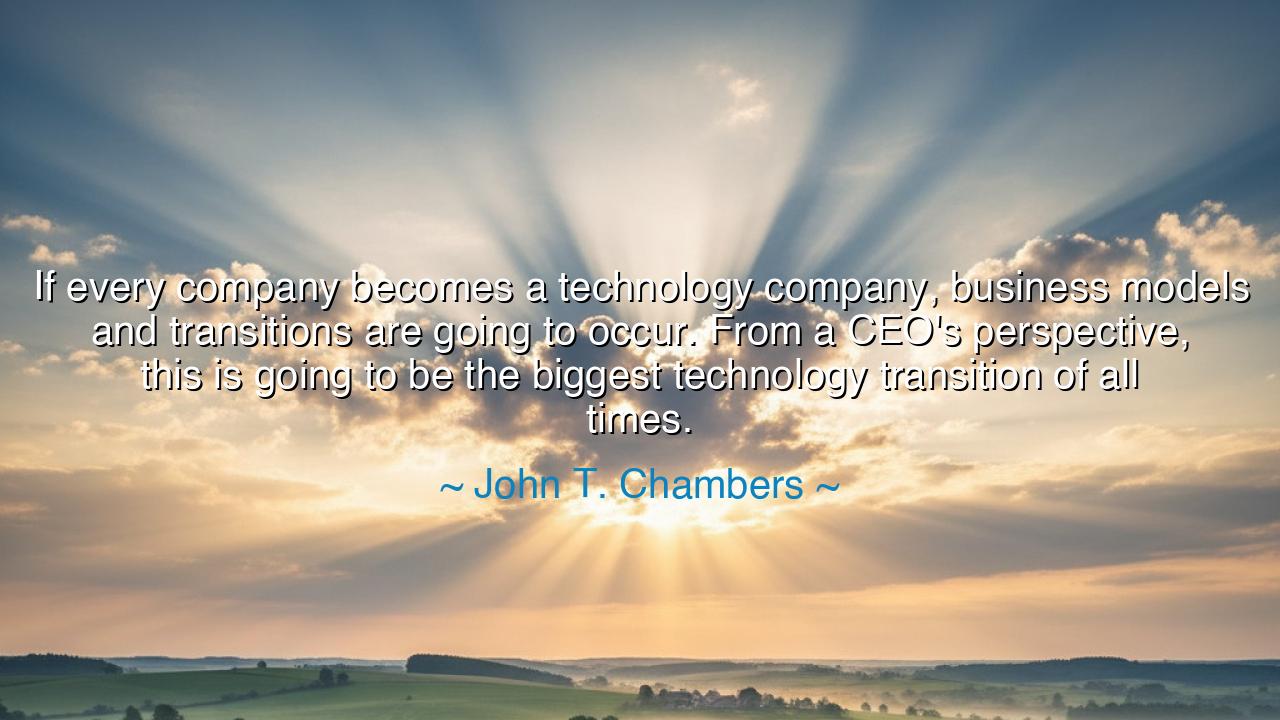
If every company becomes a technology company, business models
If every company becomes a technology company, business models and transitions are going to occur. From a CEO's perspective, this is going to be the biggest technology transition of all times.






John T. Chambers, long-time leader of Cisco and a herald of digital transformation, once proclaimed: “If every company becomes a technology company, business models and transitions are going to occur. From a CEO’s perspective, this is going to be the biggest technology transition of all times.” These words are not light; they are thunder rolling across the valleys of commerce. He speaks of an age in which the boundaries between industries blur, where every enterprise—whether it sells bread or builds ships—must wield the power of technology or risk vanishing into irrelevance.
The ancients, though they knew not computers or networks, saw similar upheavals. When the Greeks mastered the art of coinage, every business model changed; trade, once bartered with grain or cattle, now flowed through minted silver, and new kinds of wealth and power arose. When Rome built its roads, every merchant became part of a greater network, bound together by stone and empire. These were not merely tools—they were transformations. Chambers reminds us that we stand in the midst of an even greater upheaval: when every company becomes not just a user of technology, but a maker and shaper of it.
The phrase carries a deep truth: there is no refuge from innovation. A farmer once needed only his soil and plow; now he uses satellites and sensors to monitor the health of crops. A shopkeeper once needed only his storefront; now he must master online platforms, algorithms, and digital payments. From the smallest household business to the mightiest corporation, all are touched by the same fire. And as Chambers warns, this fire will not leave the old business models intact—it will melt them down and forge them anew.
History gives us a vivid mirror in the Industrial Revolution. The loom, the steam engine, the factory floor: these did not merely improve industries, they remade them. Craftsmen were replaced by machines; rural lives gave way to urban ones; fortunes shifted, and empires were reshaped. Those who adapted, like Carnegie or Ford, rose to immense power; those who clung to the past faded into dust. So too today: the rise of digital networks, artificial intelligence, and data is a revolution no less earth-shaking. Chambers calls it “the biggest transition of all times,” because it touches every sector, every leader, every worker, without exception.
But there is also wisdom in his perspective. From the eyes of a CEO, transformation is not only threat but opportunity. Each transition is a crucible in which new champions are forged. The bold who embrace technology as the heart of their strategy will thrive, while the timid who treat it as a side tool will fall. Just as the Renaissance merchants who embraced the printing press and global trade flourished, so too will modern leaders who see technology not as an accessory but as the lifeblood of their enterprise.
The lesson, then, is clear: we must each prepare ourselves for constant reinvention. No matter our station—leader, worker, dreamer—we must see ourselves as citizens of a technology-driven world. To resist change is to be swept away; to adapt with courage is to master it. Learn new tools, embrace new models, cultivate the habit of transformation. Just as a blacksmith tempers steel through fire, so must we temper our minds and spirits through the flames of innovation.
So, dear listener, hear the words of John Chambers as both a warning and a call to arms. The transition has already begun, and it is greater than any that came before. Do not cling to the comfort of yesterday’s business models; instead, prepare for tomorrow’s battles by embracing the tools of the age. For the greatest revolution of all times is not the rise of machines, but the rise of human beings who dare to wield them with vision and courage. This is the moment to lead, to adapt, and to be transformed.






AAdministratorAdministrator
Welcome, honored guests. Please leave a comment, we will respond soon